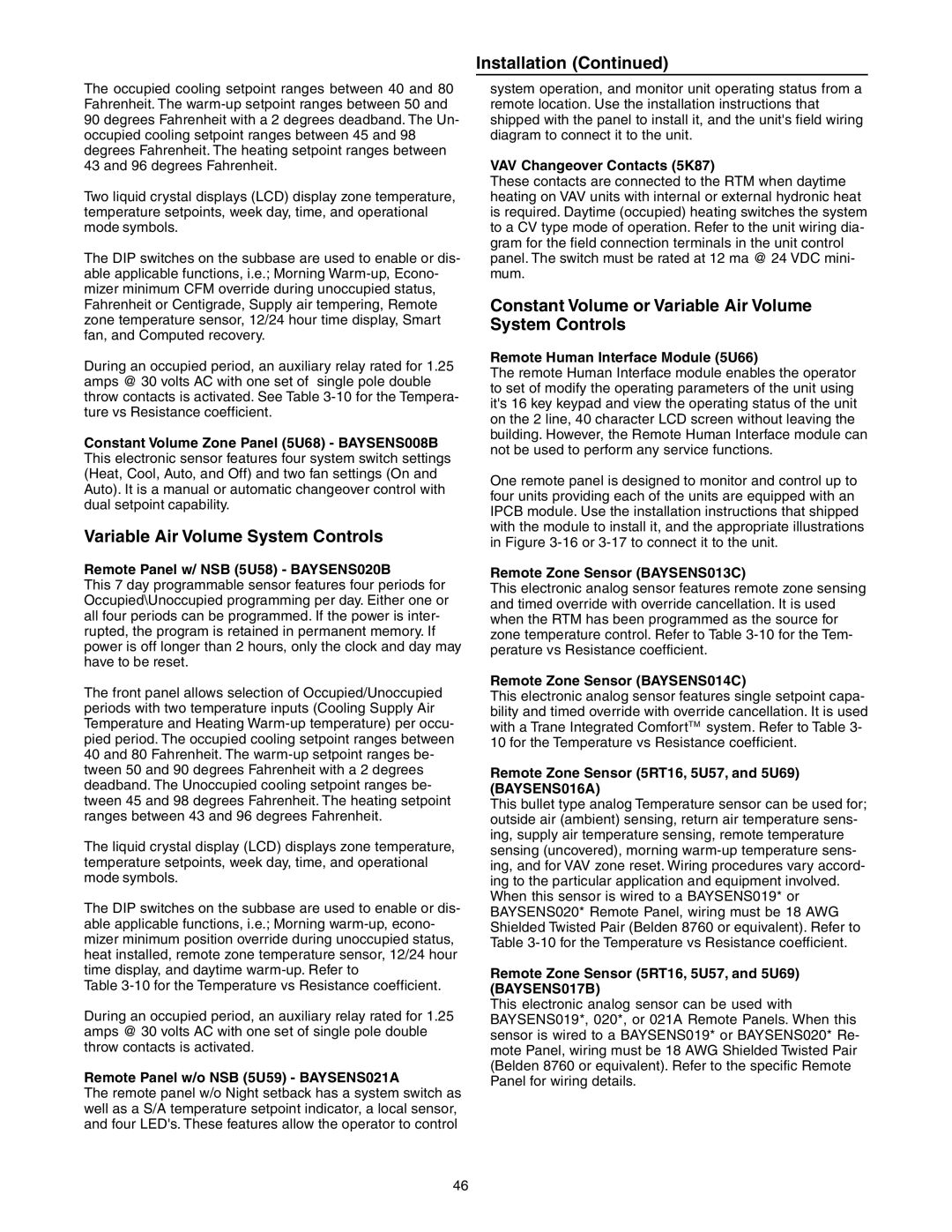The occupied cooling setpoint ranges between 40 and 80 Fahrenheit. The
Two liquid crystal displays (LCD) display zone temperature, temperature setpoints, week day, time, and operational mode symbols.
The DIP switches on the subbase are used to enable or dis- able applicable functions, i.e.; Morning
During an occupied period, an auxiliary relay rated for 1.25 amps @ 30 volts AC with one set of single pole double throw contacts is activated. See Table
Constant Volume Zone Panel (5U68) - BAYSENS008B This electronic sensor features four system switch settings (Heat, Cool, Auto, and Off) and two fan settings (On and Auto). It is a manual or automatic changeover control with dual setpoint capability.
Variable Air Volume System Controls
Remote Panel w/ NSB (5U58) - BAYSENS020B
This 7 day programmable sensor features four periods for Occupied\Unoccupied programming per day. Either one or all four periods can be programmed. If the power is inter- rupted, the program is retained in permanent memory. If power is off longer than 2 hours, only the clock and day may have to be reset.
The front panel allows selection of Occupied/Unoccupied periods with two temperature inputs (Cooling Supply Air Temperature and Heating
40and 80 Fahrenheit. The
The liquid crystal display (LCD) displays zone temperature, temperature setpoints, week day, time, and operational mode symbols.
The DIP switches on the subbase are used to enable or dis- able applicable functions, i.e.; Morning
Table
During an occupied period, an auxiliary relay rated for 1.25 amps @ 30 volts AC with one set of single pole double throw contacts is activated.
Remote Panel w/o NSB (5U59) - BAYSENS021A
The remote panel w/o Night setback has a system switch as well as a S/A temperature setpoint indicator, a local sensor, and four LED's. These features allow the operator to control
Installation (Continued)
system operation, and monitor unit operating status from a remote location. Use the installation instructions that shipped with the panel to install it, and the unit's field wiring diagram to connect it to the unit.
VAV Changeover Contacts (5K87)
These contacts are connected to the RTM when daytime heating on VAV units with internal or external hydronic heat is required. Daytime (occupied) heating switches the system to a CV type mode of operation. Refer to the unit wiring dia- gram for the field connection terminals in the unit control panel. The switch must be rated at 12 ma @ 24 VDC mini- mum.
Constant Volume or Variable Air Volume System Controls
Remote Human Interface Module (5U66)
The remote Human Interface module enables the operator to set of modify the operating parameters of the unit using it's 16 key keypad and view the operating status of the unit on the 2 line, 40 character LCD screen without leaving the building. However, the Remote Human Interface module can not be used to perform any service functions.
One remote panel is designed to monitor and control up to four units providing each of the units are equipped with an IPCB module. Use the installation instructions that shipped with the module to install it, and the appropriate illustrations in Figure
Remote Zone Sensor (BAYSENS013C)
This electronic analog sensor features remote zone sensing and timed override with override cancellation. It is used when the RTM has been programmed as the source for zone temperature control. Refer to Table
Remote Zone Sensor (BAYSENS014C)
This electronic analog sensor features single setpoint capa- bility and timed override with override cancellation. It is used with a Trane Integrated ComfortTM system. Refer to Table 3- 10 for the Temperature vs Resistance coefficient.
Remote Zone Sensor (5RT16, 5U57, and 5U69) (BAYSENS016A)
This bullet type analog Temperature sensor can be used for; outside air (ambient) sensing, return air temperature sens- ing, supply air temperature sensing, remote temperature sensing (uncovered), morning
Remote Zone Sensor (5RT16, 5U57, and 5U69) (BAYSENS017B)
This electronic analog sensor can be used with BAYSENS019*, 020*, or 021A Remote Panels. When this sensor is wired to a BAYSENS019* or BAYSENS020* Re- mote Panel, wiring must be 18 AWG Shielded Twisted Pair (Belden 8760 or equivalent). Refer to the specific Remote Panel for wiring details.
46
